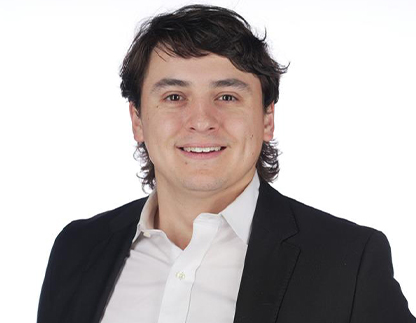Northwestern and my department provide a strong network that supports both the procurement and advancement of my research.”
Santiago Diaz-Arauzo
PhD Candidate in Materials Science and Engineering

Santiago Diaz-Arauzo is a PhD candidate in the Department of Materials Science and Engineering in the McCormick School of Engineering. In his research he finds innovative, scalable ways to produce atomically thin materials. Santiago is a member of the Hersam Research Group and the Northwestern University Research Program for High Schoolers (NURPH). He is also a recent recipient of the Ryan Fellowship.
How would you describe your research and/or work to a non-academic audience?
My research focuses on integrating two distinct processes for producing atomically thin materials with applications in biomedicine, electronics, and energy storage. While these materials hold immense potential, their scalability remains a challenge. As a result, I develop innovative manufacturing approaches to overcome production limitations and bridge the gap between lab-scale research and industrial applications.
What do you find both rewarding and challenging about your research and/or work?
I find it incredibly rewarding that my research allows me to collaborate with a diverse range of people. Since my work focuses on economies of scale, I frequently engage with vendors, academics, and government officials. Northwestern and my department provide a strong network that supports both the procurement and advancement of my research.
Why Northwestern?
I mainly picked Northwestern's Materials Science and Engineering due to the strength and breadth of the current research from the department, equally from my adviser, Dr. Mark C. Hersam. This group offers a fountain of resources to pursue your research and the high quality and character of the people in our group remain one of my main motivators to this day. Plus, the university’s proximity to nearby golf courses offers a great way to balance academia with hobbies.
What inspires you?
My parents are my greatest inspiration. As a first-generation student in the U.S., I can't overstate their sacrifices to provide me with a high-quality education and support my passion for science and sports. As I grow older, I also find inspiration in my fiancée and my dog, striving to support their passions and well-being.
What advice would you give your younger self or someone considering a similar path?
The only advice I would give to my younger self or someone else considering a similar path is to enjoy the experiences and memories around you. Often we are preoccupied with our well-being and concerned with the challenges and difficulties around us, but truly do we reflect and recall the enjoyment and excitement we experience in those moments? Ultimately, do not be afraid to appreciate moments before they are gone.
Tell us about a time when things did not go as you planned, what did you learn?
Many things often go wrong in research—our results do not make sense, our hypotheses are proven incorrect, or we face logistic and personal barriers. The cliché would be that it's a marathon, not a sprint, but I think you learn to exercise patience and be strong and direct when communicating with others. I learned now that it's important to remove yourself from the surrounding stressors and find a balance in something else that makes you happy and fulfilled.
Publish Date: April 15, 2025
If you know a graduate student, postdoctoral scholar, graduate faculty member, staff member, or a member of our TGS alumni population who would make a great candidate for our TGS Spotlight Series, please complete this brief TGS Spotlight Series Nomination Form.